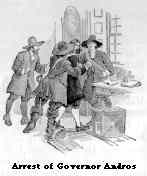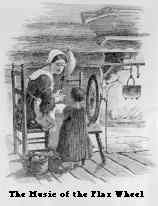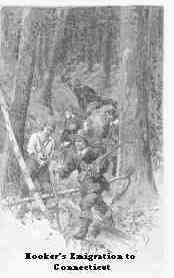Resource Center OLLibrary
|
80 |
|
[1684-1692 |
87. The Salem Witchcraft. Some years
later (1692) the Salem witchcraft caused a reign of terror in that
town. In Great Britain several thousand unfortunate persons had
suffered death for this alleged crime, and the English statute
punishing it was not repealed until 1736, or "more than forty
years after the excitement in New England had subsided." The whole
matter seems to have originated with a few mischief-loving
children who accused certain persons of tormenting them. Those so
charged were tried for witchcraft, that is, for being in league
with evil spirits, and in all nineteen persons were hanged. Then
the good sense of the Massachusetts people asserted itself, and
the witchcraft delusion came to an end.
88. Massachusetts loses her Charter; Governor
Andros. But before this strange outbreak at Salem occurred,
Massachusetts lost her charter (§ 77) and was no longer
self-governing. For many years King Charles II had watched the
Puritan colony with no friendly eye. It was far too independent to
suit his arbitrary ideas. The people of Boston were accused of
breaking the Navigation Laws (§ 54) by both importing and
exporting goods in Dutch ships; they had also coined money without
royal authority, and had given a warm welcome to two of the judges
who had sentenced Charles I (§ 53) to the scaffold and then
fled to Massachusetts. Furthermore, they were notoriously opposed
to the Church of England and were believed to be strongly
republican in their tendencies.
For these reasons the King took away their
charter (1684). Massachusetts then became a royal province, and
from that time until the Revolution it was governed by the King
and those whom the King sent to represent him.
The first royal governor imposed on the colony
(1686) was Sir Edmund Andros, who had been governor of New York.
Three years of his tyranny produced a revolt. The people took
advantage of a revolution in England which forced King James II to
flee the country; they seized Andros and imprisoned him. They then
recovered their former power of managing their own affairs in
their own way, but only for a short time.
|
1623] |
|
81 |
|
William III of England sent over a
new charter (1691), which converted Massachusetts,
Plymouth, Maine, and
90. Grant of Territory to Gorges and Mason; Settlement of Dover and Portsmouth. Sir Ferdinando Gorges obtained, with Captain John Mason, a grant of the territory between the Merrimac |
|
82 |
|
[1627-1719 |
River and the Kennebec. This region was called Maine, or the
Mainland.
The first settlement known to be permanent was
made at Dover, on the Piscataqua River, by English colonists
(1627). Four years later (1631) Portsmouth was settled. The chief
objects of these colonies were to carry on the fur trade with the
Indians and to establish fisheries. Most of the inhabitants of the
two settlements belonged, in name at least, to the Church of
England.
91. Division of the Territory; New Hampshire;
Vermont; Maine; Exeter. After a few years the proprietors,
Mason and Gorges, decided to divide the territory. Gorges took the
part east of the Piscataqua, -- a region now included in the state
of Maine; Mason took that west of the same river. He gave it the
name of New Hampshire in remembrance of the English county of
Hampshire which had once been his home. The region west of the
Connecticut River, later called Vermont, was claimed by both New
Hampshire and New York.
Sir George Popham had attempted to found a
colony on the coast of Maine in 1607, but the undertaking failed.
A permanent settlement appears to have been made (1625) at
Pemaquid Point, about midway between the Penobscot and the
Kennebec. Portland was founded some years later (1632).
Massachusetts held control of Maine from 1652 to 1820, when it was
admitted to the Union. The Rev. John Wheelwright was banished from
Massachusetts (1638) for his openly expressed sympathy with the
religious teachings of Mrs. Anne Hutchinson (§ 79). With
several of his congregation who had followed him into exile he
settled the town of Exeter, New Hampshire.
92. Settlement of Londonderry; Union with
Massachusetts. Many years later (1719) several hundred thrifty
Scotch-Irish emigrants -- or Scotch Protestants coming from the
north of Ireland -- settled Londonderry, New Hampshire. They
introduced the manufacture of linen; and soon in every log cabin
the hum of the housewife's little flax wheel made cheerful and
profitable music for the family.
|
1641-1679 ] |
|
83 |
|
One of the descendants of an
industrious Scotch settler of this class, but who came at
an earlier period, was the |
|
84 |
|
[1634-1636 |
94. Emigration to the Valley of
the Connecticut; Hooker's Colony. The rich lands of
the beautiful valley of the Connecticut River early
attracted the Dutch of New Amsterdam (§ 81) and the
settlers of Plymouth. Both made an attempt to get a
foothold on the coveted territory. But emigration did not
begin in earnest until later (1635). Then a number of
settlements were made, which finally united under one
government. We shall now take up the history of these
separate colonies. |
|
1637-1639 ] |
|
85 |
nor bridges, and the emigrants had to find their way by the
compass, crossing rivers on rafts, sleeping under the stars, and
living mainly on the milk of their cows.
After a journey of two weeks through a country
which express trains now cross in three hours, they reached
Hartford, where a small settlement of English had already been
made.
95. The Pequot War. The next spring (1637)
the new settlers declared war against the Pequot Indians, who
threatened to destroy the white settlers. The three towns of
Hartford, Wethersfield, and Windsor contributed ninety men led by
Captain John Mason. The Pequots had a fortified village near the
present town of Mystic. The little army of white men, accompanied
by Indians of tribes hostile to the Pequots, and with some help
from Massachusetts, attacked the enemy in their stronghold. They
set fire to their wigwams and literally burned them out. The blow
was a terrible one to the Pequots. From that time they were hunted
down like wild beasts, until in a few months the tribe was
practically destroyed.
96. The Connecticut Constitution, 1639.
In 1639 the inhabitants of the three towns of Hartford,
Wethersfield, and Windsor met at Hartford and drew up the first
written American constitution,' or form of government
made "by the people for the people." In the words of that
document, its object was "to maintain the peace and union" of the
settlers of the colony.
One remarkable fact about that compact is that
it made no mention either of the King of England or of the English
Company which held a royal grant of the Connecticut lands. It was
in reality the constitution of a republic, and the men who framed
it refused to bow to any authority outside or above themselves,
except that of their Maker.
1
Constitution: For the same reason that a game of ball
cannot be played successfully without some rules to govern it, so,
whenever a number of people join to form a community or a state,
they must have some form of agreement or principle of union. Such
an agreement is a constitution of government. Its object is to
secure individual liberty on the one hand, and order on the other.
The advantage of having such an agreement in writing is that it
can be readily consulted; and misunderstandings and disputes about
its meaning and application are less likely to occur than if it
was not so preserved.
 Nova
Scotia into one province. Henceforth all forms of
religion but the Catholic were permitted, and the right
to vote was no longer confined to church members (§
78). But the people had no power to make any laws except
such as the King approved, and the King continued to
appoint the governor.
Nova
Scotia into one province. Henceforth all forms of
religion but the Catholic were permitted, and the right
to vote was no longer confined to church members (§
78). But the people had no power to make any laws except
such as the King approved, and the King continued to
appoint the governor. eminent
orator, patriot, and statesman, Daniel
Webster.1
eminent
orator, patriot, and statesman, Daniel
Webster.1 VI.
CONNECTICUT (1634)
VI.
CONNECTICUT (1634)


